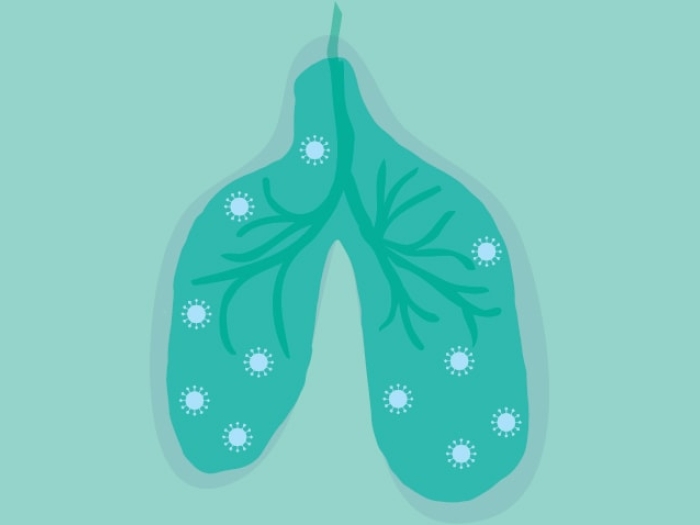Greater diversity of bacteria, and specific species, appear linked to differences over time
3:30 PM
Author |

Millions of people in the U.S. are at risk for chronic obstructive pulmonary disorder (COPD), either due to a history of smoking or exposure to air pollution and other chemical irritants. However, the condition often goes undiagnosed for years, sometimes only discovered after advanced disease has already set in.
Clinicians who specialize in lung health have called for earlier screening for COPD in at-risk people and are looking for clues to explain why some people with risk factors develop the disease, while others do not.
Now, a new study reveals a possible connection to the microbiome – the population of microbes living inside the lower airway. The research finds that at-risk individuals who had more diversity in their airway bacteria — in other words, a greater mix of species — had better respiratory outcomes, including no COPD or no progression of COPD.
“Bacteria live in the lower airways and are not necessarily innocent bystanders. Thus, they potentially play a role in shaping clinical outcomes in lung disease,” said corresponding author Yvonne Huang, M.D., an associate professor in the Division of Pulmonary & Critical Care Medicine, and the Department of Microbiology & Immunology, at University of Michigan Medical School.
The new findings come from the nationwide SubPopulations and InteRmediate Outcome Measures of COPD Study (SPIROMICS), funded by the National Institutes of Health and coordinated by the University of North Carolina-Chapel Hill. The overall goal: to uncover indicators of disease development and trajectories in COPD, a condition that typically develops over the course of decades and is more commonly diagnosed in patients older than 40.
For the new paper, published in the American Journal of Respiratory and Critical Care Medicine, the investigators analyzed samples of mucus and saliva from 877 people with a history of exposure to tobacco smoke and no or mild COPD.
Using 16S rRNA gene analysis, they looked at the populations of bacteria in each sample. In addition, each patient received CT lung imaging, clinical tests, and tests for inflammatory markers. One of the unique features of the study was the ability to follow patients over a long period of time.
“We had data from the cohort on whether they were stable up to nine years later, or whether they were declining, either slowly or rapidly,” said Huang.
Certain species of bacteria appeared to be connected to worsening COPD, including strains of Streptococcus, which correlated with more rapid decline. Conversely, the study found an even stronger signal that the presence of certain bacteria, including Alloprevotella, Oribacterium, and Veillonella, seemed to be protective against COPD.
“This study gives us clues into groups of organisms that might be at play in the progression of COPD,” Huang noted.
“Next, we need to delve into what are some of the metabolic functions of these organisms. For instance, if there are particular bugs associated with less likelihood of COPD, what functions do they possess that confer potential benefits, and what are the corresponding immune pathways in the airway that respond to them?”
The findings also point to a need to consider preservation of the lung microbiome, including caution against overuse of antibiotics.
Said Huang, “Some patients will need them when they are really sick, but frequent use of antibiotics can impact microbial diversity over time. Our findings indicate that loss of diversity is apparent even in early stages of COPD and losing this protective effect might actually enable amplification of detrimental inflammatory processes that lead someone to progress more quickly.”
Additional authors: Kristopher Opron, Lesa A. Begley, John R Erb-Downward, Gen Li, MeiLan K. Han, Craig J Galban, Ariangela J. Kozik, Jeffrey L. Curtis, Gary B Huffnagle, all of University of Michigan; Neil E. Alexis, Richard Boucher, David Couper, Mehmet Kesimer, UNC Chapel Hill; Igor Barjaktarevic, UCLA; R Graham Barr, Columbia University; Eugene R. Bleecker, Univ. of Arizona; Russell P. Bowler, National Jewish Medical and Research Center; Stephanie A Christenson, Prescott G. Woodruff, UCSF; Alejandro P. Comellas, Eric A. Hoffman, Univ. of Iowa; Gerard Criner, Temple Univ.; Christopher B. Cooper, Harbor-UCLA;Annette Hastie, Stephen P. Peters, Wake Forest University; Charles Hatt, Imbio LLC; Robert J Kaner, Weill Cornell Medical College; Jerry A Krishnan, Univ. of Illinois; David C. LaFon, UAB; Fernando J. Martinez, Cornell Medical College; Victor E. Ortega, Mayo Clinic; Robert Paine III, Univ. of Utah; Nirupama Putcha; Johns Hopkins; and SPIROMICS Investigators
Citation: “Loss of Airway Phylogenetic Diversity Is Associated with Clinical and Pathobiological Markers of Disease Development in COPD.” American Journal of Respiratory and Critical Care Medicine, DOI: https://doi.org/10.1164/rccm.202303-0489OC

Explore a variety of health care news & stories by visiting the Health Lab home page for more articles.





